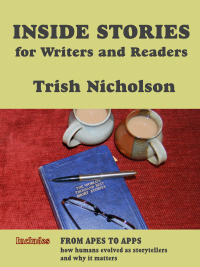Writers’ Workshops, or Workouts

Author Trish Nicholson
Have you attended creative writing workshops where so much time is spent in ‘getting into groups’, trying to agree on the ‘task’, filling huge sheets of paper with glurpy scribble from a frayed marker, and listening to all the ‘feedback’ that you forgot what the exercise was supposed to achieve?
The benefits from writers’ exchanging ideas are many – sessions at the bar during conferences often produce the greatest inspiration – but there are times and topics when the practical side of a workshop is more effective if it encourages participants to sweat their own stuff on their own storylines, sharing and discussing the process later.
Possessing knowledge is no guarantee it can be passed on to someone else, especially if that knowledge has value only when applied to a skill – where the critical outcome is to do rather than simply to know. Being ‘taught’ does not necessarily mean we have learned, although the word implies it, as if it were one complete procedure. In reality, teaching and learning are entirely separate processes.
I’m reminded of the mother and her fractious toddler who sat beside me on a long, tedious bus journey. The child persistently fiddled with the catch of the drop-down table attached to the seat in front, despite numerous warnings from his mother that he would end up hurting himself.
Inevitably, he jammed his fingers, howling his pain and indignation, to which the exasperated mother replied: “Well, that’ll lern yer.” Grammar aside, she was right.
Learning is a process we can do only from within ourselves. For many writers, experimenting, fiddling, getting our fingers pinched and howling our pain and indignation is how we develop.
 Writing is a state of being, or more accurately, of ‘becoming’, because we are never ‘complete’ – inner searching and vulnerability are the milieu of a writing life. More significant than the issue of whether it can be taught, is the question of whether creative writing can be learned.
Writing is a state of being, or more accurately, of ‘becoming’, because we are never ‘complete’ – inner searching and vulnerability are the milieu of a writing life. More significant than the issue of whether it can be taught, is the question of whether creative writing can be learned.
Because we can be aware of our own development in style, voice and talent, and the influence of editors, critiquers and other writers, it is clear that important aspects of it can be learned. We need to be honest with ourselves, to be responsive to feedback and able to assess its relevance, but if we write enough, we constantly develop our craft.
Imagination, inspiration, intuition, originality, and the passion to communicate – all the inner modes of thought on which writers depend – cannot be taught. But good teaching can aid their unfolding by offering stimulation, guidance, support, challenge, and knowledge of technique. By these means, workshops can be designed that concentrate on learning rather than teaching.
The topic is on my mind because I was recently invited to present one of the workshops for a NZ Society of Authors weekend of events. For the subject, I chose to explore the process of finding deep character in writing fiction, and spent several weeks working out the best format and testing it out on writing friends. Judging from the feedback, everyone found the workshop a productive and fun experience, so much so that I am presenting it at several locations in the UK and Netherlands during September and October as part of a promotional tour for my two latest books on writing craft.
Practical ‘workout’ experiences can be created by any group of writers. ‘Finding Deep Character’ grew out of the ‘character’ chapter of Inside Stories for Writers and Readers, but you could use any chapter as the framework for a workshop – I wrote it with that in mind. So, here are six tips for designing your own ‘workouts’.
- Agree on a specific target for the session rather than trying to cover too much. Focus on the outcome: at the end of the workout, what will participants have produced, and what will they be able to ‘do’.
- Allow enough time for sharing what people have written during practise sessions, for giving mutual feedback, and for brainstorming ideas. This means keeping numbers small, a maximum of 12-15 participants enables everyone to interact.
- Keep the practical activities ‘real’: rather than set theoretical or isolated exercises, have each person work progressively on a storyline, character or theme of their own that fits the purpose of the workshop – something they can develop further themselves if they wish.
- Design the workshop leader’s input and the practical activities to engage as many of the senses as possible – provide items to touch, see, hear, and even to taste and smell, and don’t forget the sense of humour. The more senses involved, the more the imagination is stimulated and the greater the learning.
- Wherever possible, use methods of exploration and inspiration that participants can ‘take away’ with them to apply in the future. What each learns and how they can use it will be slightly different for each person.
- At the conclusion of the session, provide a handout that summarises the main points of the workshop and the methods used. If you tell participants at the beginning that you will do this, it enables them to focus on what is taking place rather than making notes about it.
These methods also apply to non-fiction. My tour programme includes some non-fiction sessions because creative writing techniques and deep character portrayal are equally important in narrative non-fiction.
I hope these tips encourage you to get together with your writing buddies and create your own ‘workouts’. And if you can share any additional tips, or tell us about other workshop activities that you have found particularly useful, that would help everyone.
—
Trish Nicholson writes narrative non-fiction and short stories, and is the author of three recent books on writing and storytelling: Inside Stories for Writers and Readers , Writing Your Nonfiction Book: the complete guide to becoming an author , and From Apes to Apps: how humans evolved as storytellers and why it matters . She lives in New Zealand and you can visit her in her Treehouse, and see where she is presenting workshops here: www.trishnicholsonswordsinthetreehouse.com
Category: Contemporary Women Writers, How To and Tips




It’s also really, really important to make sure that the workshop fits the way you write. I’m an organic writer, which means I don’t outline. In the writing world, most of the workshops are tailored more for people who outline. I used to tell myself that the workshops would give me knowledge that I could reshape for my own writing, without the outlining parts. I even had a writer (an outliner who had experimented with not outlining on several projects) tell me the two writing process weren’t different.
Then I found some workshops by organic writers, and I was astounded by the difference. These actually felt like me! And I also realized that the problems I had gone to the other workshops for were all these pieces of knowledge that I’d taken from the outlining classes. They just didn’t fit me, in spite of what the writing world says.
Thank you for adding that, Linda, an important point, and we all learn in different ways, too. I find that the use of sensory cues or prompts for each person to apply the ideas being explored, does allow writers to work with them in their own way. Basing practical ‘exercises’on participants’ own work rather than pre-structured tasks also allows writers to follow their own approach. As you say, it’s a matter of finding the learning environment that inspires you.
As a educator involved with working with teachers on ‘teaching for learning’ for twenty years, I recognise your message here. The deepest learning is more affective than cognitive, and the ‘teacher’s job is to develop that learning. It takes thought and care and creativity, as you describe. If you can help people to both provide and receive feedback effectively you’ve given them a great gift to take away.
Thank you for such insightful comments, Ruth. And I agree, these methods have wider application beyond creative writing. Perhaps reaching and sharing deeper feeling that leads to more effective learning is something writers can contribute to their communities – experience that could enrich them also. If there are writers who already do this, it would be wonderful to learn about it here.
Hi Jo, of course, every writer’s journey is a solo, we have to struggle with our personal processes and only our own fingers tap these keys, but I think there is much to be gained from sharing some of it with other travellers on the road. Thanks for commenting, happy travelling and happy writing.
I recognise those workshops from my Child Protection days – we could spend training hours fiddling with processes in an unconscious (or sometimes conscious) way of avoiding tackling the real issues.
Any writing workshop, even when it gets a bit faffy, has been a delight after some of those! But finding out about my own processes has been a tortuous, individual adventure, discovering what works for me and what doesn’t.